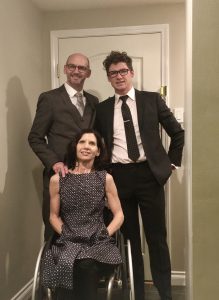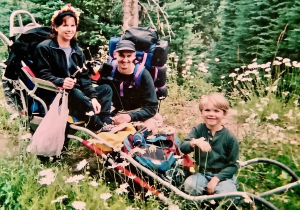Authors: Sarah Yada Seto, Dominik Zbogar | Published: 4 March 2021
Resilience Has No Bounds –
Sherry’s Journey as a Mother Living With SCI
When you first meet Sherry Caves, you can immediately sense she has a strong will, and is full of determination. Hit by a drunk driver when she was just seven years old, Sherry is paraplegic and has undergone 13 or 14 spinal surgeries over the years. Despite this accident, Sherry continues to live an active life, full of adventure – she’s gone sailing, hiking, zip lining and even bungee jumping. She and her husband, Darryl, also have a son, Aidan, now 26-years old.
“I never grew up feeling like I had much of a disability,”  Sherry mused. “As a teenager, when I travelled from my hometown to compete in sports, I had met one or two girls my age with an SCI. As an adult, though, I really didn’t know many girls or women with an SCI. “When I became pregnant with my son, Aidan, I tried to seek out peers that had experienced pregnancy and parenting but with no luck. So, I went through it with a bit of ignorant bliss; with the same angst as any other mom-to-be but not knowing how my body was going to respond as I grew. I soon realized that doing this while living with an SCI … that your disability could be magnified and at times be at the forefront.” When Aidan was born, Sherry and Darryl’s lives changed like any new parents’ lives would. Sherry quickly found ways to adapt to her new life as a mom. Back then it was less about technological help, and more about the mental strength and fortitude to persevere during the ups and downs of raising a child.
Sherry mused. “As a teenager, when I travelled from my hometown to compete in sports, I had met one or two girls my age with an SCI. As an adult, though, I really didn’t know many girls or women with an SCI. “When I became pregnant with my son, Aidan, I tried to seek out peers that had experienced pregnancy and parenting but with no luck. So, I went through it with a bit of ignorant bliss; with the same angst as any other mom-to-be but not knowing how my body was going to respond as I grew. I soon realized that doing this while living with an SCI … that your disability could be magnified and at times be at the forefront.” When Aidan was born, Sherry and Darryl’s lives changed like any new parents’ lives would. Sherry quickly found ways to adapt to her new life as a mom. Back then it was less about technological help, and more about the mental strength and fortitude to persevere during the ups and downs of raising a child.
What years were the most challenging for Sherry as a mother? “I’d have to say when your child is under 2 years old, and is not mobile. For me, when he was a baby to toddler, it was more of a physical challenge; it was a little harder for me, with balance and with being fused. I learned that when I dressed him in overalls, it made it easier to grab hold of this crawling baby from the floor. Over time, a certain dynamic develops – children discover quickly that you aren’t able to pick them up the same way as others perhaps and they figure out how to crawl up using your chair to get on your lap. They’re always motivated to be with you. After that, it’s normal parenting.”
“I lived in the West End and would have Aidan walk beside me from when he was about 2 or 3. My rule was that he would have to have his hand on my lap for safety if just he and I were out for a walk. If he took his hand off my lap, he knew he’d be back on my lap or we’d go home. He learned it was all about safety.”
The family’s passion for the outdoors continued through the years raising Aidan. She needed to find adaptable ways to cope with wheeling across grass, parks, and beaches. During those times she would often use a scooter for a day outing to English Bay or Second Beach pool back when Aidan was 4 or 5 years old. In recent years, using a Freewheel attachment has been helpful.
“You want to keep up with them. You don’t want to limit them. There has been an explosion in wheelchair technology recently which I didn’t have access to when my son was younger. Nowadays there are power assist wheels or e-front wheel drive attachments that are quite affordable that enable a level of independence depending on your level of SCI. I’ve also had the same handcycle since my son was about 9 years old – I wished I had a Bionx (e-bike motor add-on) back then! They came out with them years later and it allowed me to cycle easier and more enjoyably while keeping up with the family.” Fostering a love for cycling would propel Aidan to eventually become a member of the Canadian Men’s National Track Cycling Team, medaling at several international World Cups, Commonwealth Games and multi-Pan-American games, retiring just this year.

Sherry Caves, pictured here with husband, Darryl and son, Aidan, on the Access Challenge overnight hike in Manning Park over 20 years ago.
Does Sherry have any final words of advice for people living with SCI – looking to become new parents in the future – particularly when the world is facing a global pandemic? “It’s wonderful, rewarding, and challenging. Focus on your health. If you’re not healthy, it complicates everything. COVID-19 has added that extra layer of risk. But I feel people with SCI have already been down for the count with issues like AD, wounds or UTI’s. You just have to stop, recalculate and wait until you’re healthy, and start again. I guarantee this isn’t the first time we’ve all had to stop and restart.”
“Join a support network. SCI-BC and BCMOS (BC Mobility Opportunities Society) are great resources and have awesome support networks. A friend and I started a ‘Women with SCI’ support group years ago and to this day, there are about 10 of us that still go out for lunch and dinner (pre-COVID-19 times).” Sherry stops for a moment and adds one more word of advice. “Take things in stride – life is ever changing. No one phase will ever stay the same.”
These are words that all of us are sure to agree with and can take to heart.
![]()





